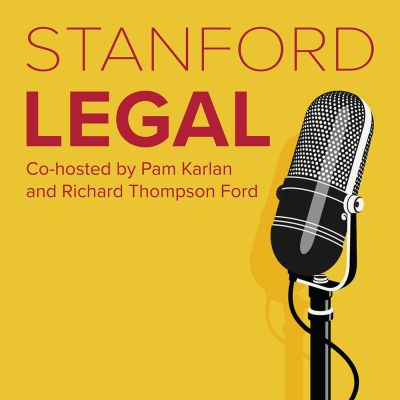Law touches most aspects of life. Here to help make sense of it is the Stanford Legal podcast, where we look at the cases, questions, conflicts, and legal stories that affect us all every day. Stanford Legal launched in 2017 as a radio show on Sirius XM. We’re now a standalone podcast and we’re back after taking some time away, so don’t forget to subscribe or follow this feed. That way you’ll have access to new episodes as soon as they’re available. We know that the law can be complicated. In past episodes we discussed a broad range of topics from the legal rights of someone in a conservatorship like Britney Spears to the Supreme Court’s abortion decision to how American law firms had to untangle their Russian businesses after the invasion of Ukraine. Past episodes are still available in our back catalog of episodes. In future shows, we’ll bring on experts to help make sense of things like machine learning and developments in the regulation of artificial intelligence, how the states draw voting maps, and ways that the Supreme Court’s affirmative action ruling will change college admissions. Our co-hosts know a bit about these topics because it’s their life’s work...
https://law.stanford.edu/stanford-legal-on-siriusxm/
episode 133: AI in Government and Governing AI: A Discussion with Stanford’s RegLab
Joining Pam and Rich for this discussion are Professor Daniel Ho and RegLab Fellow Christie Lawrence, JD ’24 (MPP, Harvard Kennedy School of Government).
Dan is the founding director of Stanford’s RegLab (Regulation, Evaluation, and Governance Lab), which builds high-impact partnerships for data science and responsible AI in the public sector. The RegLab has an extensive track record partnering with government agencies like the Environmental Protection Agency, Internal Revenue Service, the U.S. Department of Labor, and Santa Clara County on prototyping and evaluating AI tools to make government more fair, efficient, and transparent. Building on this work, the RegLab also helps agencies strengthen AI governance and operationalize trustworthy AI principles.
Christie, a third-year JD student, worked with RegLab and Stanford’s Innovation Clinic on projects to advise DOL on responsible AI and development practices and to support the work with Prof. Ho on the National AI Advisory Committee, which advises the White House on AI policy. In this interview, we’ll learn about several RegLab projects—and the importance of helping government develop smart AI policy and solutions.
Connect:
- Episode Transcripts >>> Stanford Legal Podcast Website
- Stanford Legal Podcast >>> LinkedIn Page
- Rich Ford >>> Twitter/X
- Pam Karlan >>> Stanford Law School Page
- Stanford Law School >>> Twitter/X
- Stanford Law Magazine >>> Twitter/X
Links:
- Dan Ho >>> Stanford Law School web page
[00:00:00] Chapter 1: Setting the Stage
- Mention of the rapid acceleration of technology and the release of ChatGPT.
- Highlighting the risks associated with AI, such as bias and privacy concerns.
- Discussion on the relationship between AI and governance, including recent developments in AI policy and governance.
- Mention of the Biden administration's executive order on AI and its implications.
[00:03:04] Chapter 2: The Role of Reg Lab and Collaboration with the IRS
- Explanation of the Reg Lab and its purpose.
- Discussion on the need for government agencies to modernize their technology infrastructure.
- Overview of the collaboration with the IRS to improve tax evasion detection using machine learning.
- Discovery of disparities in auditing rates and subsequent IRS reforms.
- Highlighting the intersection of AI, social justice, and government practices.
[00:09:12] Chapter 3: Student Perspective
- Christie Lawrence shares her experience working on AI policy at Stanford Law School.
- Discussion on bridging the gap between policy, law, and technology.
- Impactful work done by students in collaboration with government agencies.
[00:11:38] Chapter 4: AI and Social Justice
- Pam Karlan's experience with AI issues in the Justice Department's Civil Rights Division.
- Examples of algorithmic discrimination and its implications for social justice.
- Discussion on the challenges of addressing AI-related issues in government practices.
[00:23:55] Chapter 5: Future Directions
- Optimism about the future of AI governance and the recent executive order's impact.
- Anticipation of legislative proposals and state-level initiatives in AI regulation.
- Importance of maintaining an open innovation ecosystem and addressing talent gaps in government agencies.
[00:25:55] Chapter 6: Audience Questions
